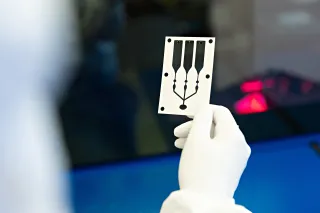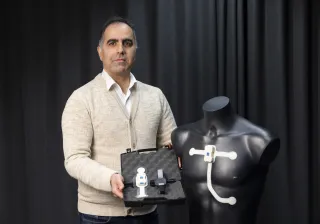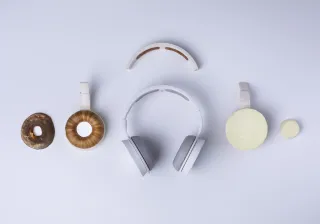Resin and tree bark have antimicrobial properties that can be utilised in a hospital environment. The suitability of safe and environmentally friendly wood-based antimicrobial solutions as replacements for plastics in the hospital environment was tested at the Central Finland Central Hospital in Jyväskylä.
A joint project of VTT, Jyväskylä University of Applied Sciences, the Central Finland Health Care District, and private companies in the field has shown that wood-based compounds are effective in reducing microbes. The project also involved testing of UV camera technology to evaluate the cleanliness of surfaces.
Resins and wood bark tannins reduce bacteria in curtains
Antimicrobial properties – the ability to kill microbes and prevent their growth – are required for curtains in patients’ rooms. Tests were conducted at Central Finland Central Hospital Nova to determine how the numbers of microbes in curtain fabrics treated with wood bark tannins differed from those in ordi-nary curtains in a two-month follow-up period.
Resins and wood bark tannins were shown to be promising antimicrobial compounds. In a test conducted at the hospital's ward for internal medicine and pulmonary diseases, the microbe levels in curtains in patient rooms that been treated with biobased antimicrobial coatings were monitored for two months.
“The tannin level reduced the total number of bacteria in the curtain by as much as 60 percent. In addi-tion, further testing showed that the effectiveness can be enhanced by lightly moistening the tannin coating, thereby improving the contact between the bacteria and the tannins”, says VTT Senior Scientist Matti Virkkunen.
Also tested in the project were the functionality and durability of dirt-resistant and more easily cleaned coatings with several surface materials used in the hospital. Hygiene measurements conducted by the hospital showed that the hygiene levels of the coated areas were 32 percent better than with the uncoat-ed control surfaces.
The increase in impurities on the surfaces was observed using a UV-sensitive camera
One of the goals of the project was to find a new, effective, and fast way to examine the results of cleaning work. Based on the studies, the use of UV camera technology to identify impurities appeared to be the most promising.
“Dirty spots were identified using UV camera technology on many different surfaces even though no visible sign of impurities could be seen under normal room illumination. One target of testing was the accumulation of contamination on the door handles of a school building. Photographs of the door handle samples taken with a UV camera revealed spots indicating both the presence of dirt and a deterioration of the antimicrobial coating even though they appeared to be clean”, says specialist Jaana Mäkelä of the Jyväskylä University of Applied Sciences.
Sami & Samu project
The two-year Sami & Samu project was launched in August 2018 with a total budget of EUR 657,000. The project was carried out by VTT, Jyväskylä University of Applied Sciences JAMK, and the Central Finland Health Care District together with industries in the field. The project was coordinated by VTT. The Regional Council of Central Finland was the main funder of the project, and funding was also provided by the research partners and participating companies. The results of the project came out in the spring of 2021 and the project was concluded in June 2021.
Companies participating in the project: KiiltoClean Oy, Millidyne Oy, Paptic Oy, Sakupe Oy, Serres Oy, UPM-Kymmene Oyj, Walki Oy, Woodly Oy and Repolar Pharmaceuticals Oy.
The final report of the project is accessible through this link.
In the photo: Laboratory engineer Samppa Alanen of the Jyväskylä University of Applied Sciences studied the use of camera technology for the identification of microbes and impurities on hospital surfaces.
Further information
VTT
Senior Scientist Matti Virkkunen, Tel. +358 40 5451743 [email protected]
Jyväskylä University of Applied Sciences JAMK
Specialist Jaana Mäkelä, tel. +358 400 917386, [email protected]





